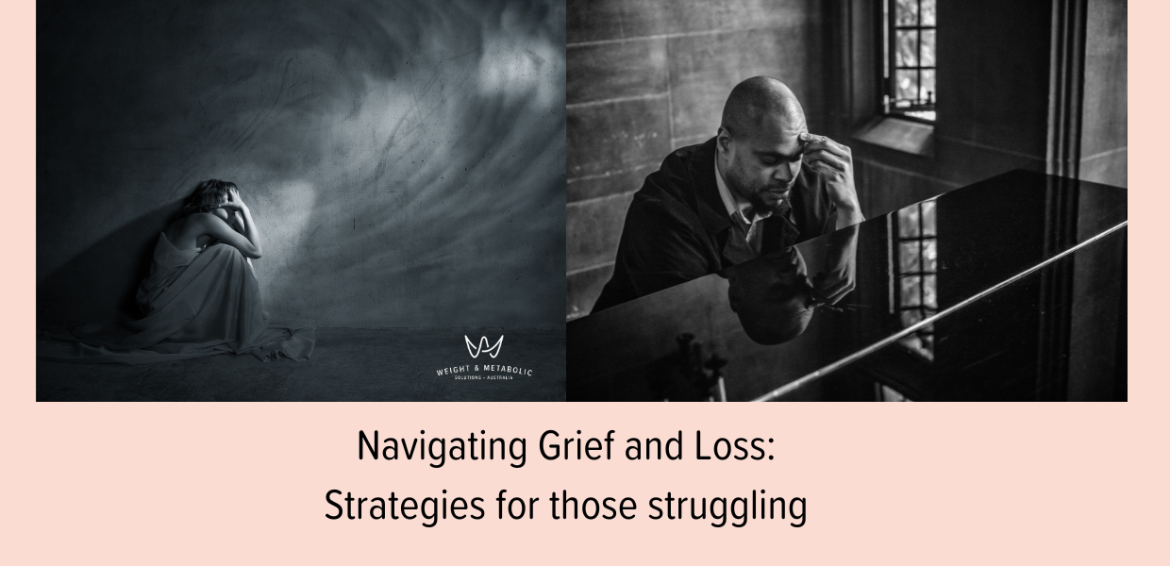Struggling with Grief and Loss
First and foremost, we need to remember that WE ARE NOT OUR THOUGHTS. We have a countless number of thoughts passing through our minds every day. Our brains do not stop. Imagine if you gave gravity to all of those thoughts equally, it would be absolute chaos, you would not be able to function normally.
Some thoughts you may not even be really conscious of; “those shoes are ugly”, “ew, there’s gum there”, “I have an itchy ear”; these are not very important and so we move past them quickly. Some other thoughts may surprise us or scare us, and so we hold onto them more than needed. Think about the quality of some of those thoughts…I could have a thought of me flying in my car to work to bypass all the traffic, I could have a thought of punching a screaming child, I could have a thought of going for a run. Did having those thoughts actually make me fly, hurt the child, or go exercise? Absolutely not. So why is it then, that we hold on to some negative thoughts and view them as fact? Ruminating on negative thoughts such as “I’m lazy”, “I hate my boss”, “I can’t do it”, “I’m fat” will likely reduce your mood, and will possibly lead to no positive outcome. Here are some strategies to help distance yourself from your negative thoughts.
Fact vs Opinion
When you have a negative thought, ask yourself, “is this factual?”, “is there actual evidence for it?”. Most of the time, you’ll find that the answer is “no”, and that is the first step in distancing yourself from your thought; purely identifying it as an opinion.
Helicopter technique
When having a negative thought, you can try to STOP. Stop whatever you are doing. Imagine you are in a helicopter flying over yourself. Look down at the situation, look around. Analyse the context and yourself from a third person perspective. Notice yourself having the thought, instead of letting yourself become engulfed by it. You may think, “I see this person driving to work, listening to music, waiting in traffic. They are worrying about how they will go in today’s meeting at work, if they will let the team down and look stupid in front of their boss”. Try to zoom out and look at the big picture.
“I’m having the thought that…”
Once you have identified your thought as opinion, amplify the distance by saying “I’m having the thought that” directly before your thought. For instance, “I’m having the thought that I am stupid”.
Thanking the mind
Another strategy could be to thanking the mind for providing you with the thought. This “thank you” can, by all means, be sarcastic. When using sarcasm, we tend not to take the thought too seriously. “Thank you mind, for that interesting thought”.
Name the story
If you find that a particular negative thought keeps coming back (such as “I am a horrible teacher”), try to name the thought like you were naming a story. Whenever the thought pops into your head, say something along the lines of “oh hello, it’s the ‘Miss Incompetent Teacher story’ back again”.
Alter the tone, voice, speed of the thought
Start by repeatedly saying/thinking the thought and alter how it sounds. Try to say/think it in a high-pitched voice, on super speed, or even in the voice of a cartoon or movie character like ‘SpongeBob’ or ‘Don Corleone’ from ‘The Godfather’.
I understand that some of these techniques may seem ridiculous or “silly”, but they are generally effective in reducing the gravity of the thought, and you will likely take the thought less seriously. You may even be thinking whilst reading this “this is stupid, I’m not a child, it’s not going to do anything”…start by distancing yourself from THAT thought. Maybe try saying, “I’m having the thought that…”.
But what if it is fact?
I also wanted to touch on what to do when you do encounter a thought that is factual. For instance, “I am physically tired”, “I am by clinical standards overweight”. Well, most likely it is good that you are aware of the issue, generally that is a good first step. What is crucial in that moment though, is to adopt a goal-oriented focus. Ruminating on the negative thought generally leads to lowered mood or anxiety due to other (possibly non-factual) thoughts being triggered. Identify those thoughts as opinion and ask yourself what you can do that is in your control to help the situation. If you are tired, could you rest? If you are overweight, could you seek help or alter your lifestyle? Maybe there is something that you are already doing to improve your situation, and if that is the case, try to focus on those positives, on your effort to change.


